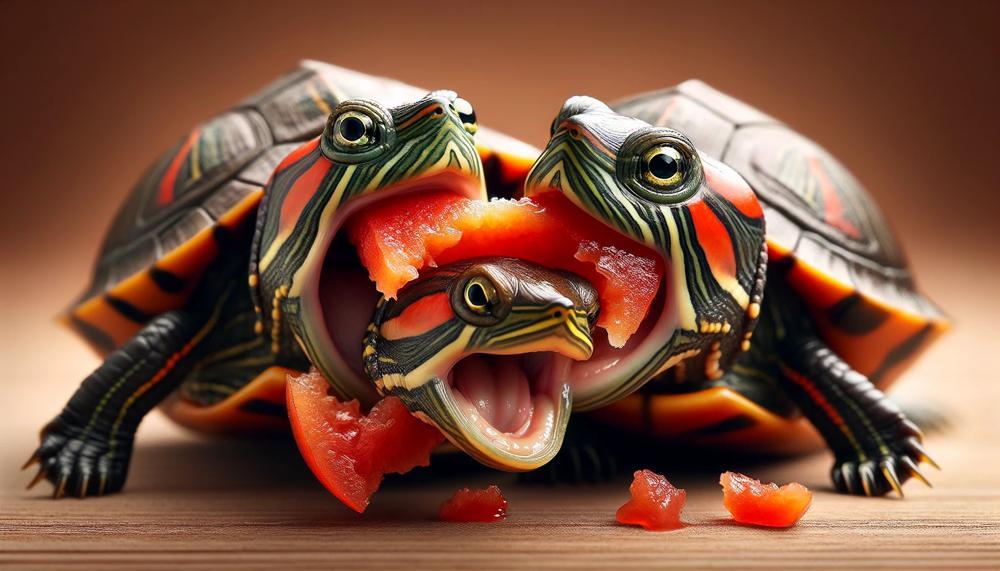Do you have a soft spot for turtles? Do you find yourself captivated by the charming red eared slider turtle, with its striking markings and amiable personality? These beloved pets are adored for their endearing traits, but they also have a less-than-adorable habit: biting. Yes, you heard it right – these seemingly gentle creatures can deliver quite a nip.
We embark on a journey into the world of red eared slider turtles and their biting tendencies.
In this blog post, we will delve into the reasons behind their biting behavior, ways to prevent it, and what to do if you happen to be on the receiving end of their sharp little jaws.
So, do red eared slider turtles bite?
Yes, red-eared slider turtles can bite. They are not aggressive with humans, but they may bite if they are scared or handled roughly. Bites from red-eared sliders are generally not considered dangerous to humans and have relatively weak bites. However, bites can be painful and may be more damaging to young kids with small fingers. In most cases, a bite is a result of an animal being mishandled or hurt. Some red-eared sliders don’t seem to mind being picked up and handled, but it is generally safer for your pet to be kept in their cage. Red-eared sliders may bite or scratch when being picked up, so use caution. If you are bitten by a red-eared slider, you should cleanse and treat the wound as you would a minor wound. If you have not had a tetanus shot within 10 years, a tetanus shot may be required. If you are not sure when you had your last tetanus shot, and you’ve been bitten, you should get one within 72 hours after your injury.
Let’s dive in.
Contents
- 1 Are Red-Eared Slider Turtles Aggressive?
- 2 Why Does My Red-Eared Slider Try to Bite Me?
- 3 Do Red-Eared Sliders Have Teeth?
- 4 What To Do if My Red-Eared Slider Turtle Bites Me?
- 5 What Happens If a Turtle Bites You?
- 6 Are Turtle Bites Dangerous?
- 7 Do Red-Eared Sliders Bite Other Turtles?
- 8 Do Red-Eared Slider Turtles Live Longer if They Don’t Bite?
- 9 Conclusion
Are Red-Eared Slider Turtles Aggressive?
Red-eared slider turtles may exhibit aggression as a natural behavior, but it is not typically observed in well-cared-for pets. Several factors, such as inadequate living conditions, genetics, and individual personalities, can contribute to aggressive behaviors.
As responsible owners, it is our duty to create a stress-free environment for our turtles to minimize the chances of aggression.
If you have any concerns about your turtle’s behavior, it is best to seek advice and guidance from a reptile veterinarian. Below is a table summarizing the various factors that can influence aggression in red-eared slider turtles.
| Factors | Description |
| Environmental factors | Inadequate space, diet, hiding spots, and basking areas can cause stress and lead to aggression. |
| Genetics | Some turtles may have an innate tendency towards aggression due to their genetics. |
| Individual personalities | Turtles may exhibit varying levels of aggression based on their unique personalities. |
| Mating season | During breeding season, male turtles may display heightened levels of aggression. |
| Competition for territory or dominance | When competing for territory or dominance, two male turtles may display aggressive behaviors towards each other. |
| Handling | Turtles may resort to biting when they feel threatened or mishandled by humans. |
| Sharing tank with other turtles | Sharing a tank with other turtles can lead to competition for resources and result in aggressive behaviors towards each other. |
| Nutrition and care | Inadequate diet and improper handling can also contribute to aggressive behaviors in turtles. |

Why Does My Red-Eared Slider Try to Bite Me?
Red-eared slider turtles are known for their docile nature and friendly demeanor, but they may display biting behavior if they feel threatened or stressed. As a responsible owner, it is important to understand the reasons behind this behavior and take steps to address it.
Here, we will provide you with some useful tips on how to train your red-eared slider turtle to stop biting.
Understand the Reasons for Biting
As mentioned before, turtles may bite out of fear or stress. It is crucial to observe your turtle’s body language and try to identify triggers that may cause them to feel threatened.
This can include sudden movements, loud noises, or handling them too roughly.
Handle Your Turtle Gently
When handling your turtle, make sure to approach them slowly and avoid sudden movements. Use gentle and firm pressure when holding them to make them feel secure and reduce the chances of being bitten.
Avoid Handling During Feeding Times
Turtles can become territorial during feeding times, so it is best to avoid handling them during this time. This will help reduce the chances of being bitten and prevent potential aggressive behavior.
Train Your Turtle Using Positive Reinforcement
Turtles can be trained using positive reinforcement techniques, such as rewarding them with treats when they display good behavior. This will help them associate good behavior with receiving a reward and discourage biting behavior.
Provide a Stress-Free Environment
Make sure your turtle has a spacious and clean enclosure with proper lighting and temperature. This will help reduce stress and aggression in turtles, making them less likely to bite.
Seek Professional Help if Necessary
If your turtle continues to exhibit aggressive behavior despite your efforts, it is best to consult a reptile veterinarian for further guidance and advice.
Some turtles may have a genetic predisposition towards aggression, so seeking professional help may be necessary.
Expert Insight:
Turtles may become fearful or stressed if they feel threatened in their environment. It is important to observe their body language and handle them gently to help alleviate these feelings.
Turtles can also become territorial during feeding times, so avoiding handling during this time can prevent potential biting.
Do Red-Eared Sliders Have Teeth?
Red-eared slider turtles do not possess conventional teeth like mammals do. Instead, they have adapted to their aquatic lifestyle by developing unique structures in their mouths. These structures, called tomial teeth, serve the purpose of gripping prey while consuming it whole.
Additionally, they also have a beak-like structure composed of keratin that helps them break down tougher food items. Although these are not technically teeth, they can still inflict a painful bite if provoked or mishandled.
As responsible owners, it is crucial to handle our turtles with care and seek expert assistance if necessary to address any biting tendencies.
What To Do if My Red-Eared Slider Turtle Bites Me?
If you happen to get bitten by your red-eared slider turtle, here are some steps you should take to ensure the well-being of both yourself and your pet:
- Immediately clean the wound with soap and water.
- If the bite breaks the skin, apply pressure to stop bleeding and seek medical assistance if necessary.
- Apply antibiotic ointment to the wound and cover it with a sterile bandage.
- Monitor for any signs of infection, such as redness, swelling, or discharge.
- Seek medical attention if the wound shows signs of infection or does not heal properly.
It’s important to keep in mind that while red-eared sliders are typically not aggressive animals, they may bite if they feel threatened or mishandled. To prevent future bites, it’s crucial to give turtles enough space and handle them with care.
What Happens If a Turtle Bites You?
Being bitten by a red eared slider turtle is not something that happens often, but it can have serious consequences that should not be ignored. These include physical pain and injury, the possibility of infection, and even emotional effects. As a responsible pet owner, it is crucial to handle and care for your turtle properly to avoid any negative incidents.
While turtles may seem like harmless creatures, their bites can be quite painful. The sharp edges of their beaks can easily break the skin, causing bleeding and bruising. In some cases, the injury may even require medical attention. It is essential to handle turtles gently and with care to avoid getting bitten.
Aside from physical pain, there is also a risk of infection from a turtle bite. Turtles carry bacteria in their mouths that can cause infections in humans. These infections can range from minor skin irritations to more serious illnesses. It is important to clean and disinfect any wounds caused by a turtle bite and seek medical attention if necessary.
In addition to physical consequences, being bitten by a turtle can also have emotional impacts. It can be a frightening experience, especially for children or those who are not familiar with turtles. This can lead to fear or anxiety towards turtles or other animals in general. Therefore, it is crucial to educate yourself and others on proper handling techniques to prevent any negative experiences.
Are Turtle Bites Dangerous?
Turtle bites can have varying levels of severity and it’s important to be cautious to avoid them. In addition to causing physical harm, turtle bites can also transmit harmful bacteria and pathogens which can result in infections.
To prevent bites, a good understanding of turtle behavior is key and they should always be handled gently to avoid sudden movements or loud noises. If a bite does occur, it’s important to immediately clean and disinfect the wound to prevent infection.
Do Red-Eared Sliders Bite Other Turtles?
When it comes to red-eared slider turtles, biting is a natural behavior that can occur in various situations.
For example, when establishing dominance, defending their territory, dealing with overcrowding, or competing for food.
Do Red-Eared Slider Turtles Live Longer if They Don’t Bite?
While it may not have a direct impact on the lifespan of red-eared slider turtles, preventing biting behavior can greatly benefit their overall health and well-being. By avoiding bites, owners can prevent potential infections and injuries for both themselves and their turtles.
Additionally, reducing aggression within group housing can also promote better health and reduce stress for the turtles, potentially leading to a longer lifespan.
Furthermore, providing proper care and handling for red-eared slider turtles can also have a positive effect on their overall health and potentially increase their lifespan. This includes ensuring they have a suitable habitat with clean water and a varied diet, as well as scheduling regular check-ups with a veterinarian.
By keeping these factors in mind and preventing biting behavior, owners can contribute to the longevity of their pet turtles.
| Factors that Can Impact the Lifespan of Red-Eared Slider Turtles | Potential Benefits of Discouraging Biting Behavior |
| Proper Habitat | Reduced stress and improved health for the turtle |
| Clean Water | Prevent infections from bites and injuries |
| Varied Diet | Promote overall good health and well-being |
| Regular Veterinary Check-Ups | Early detection and treatment of any underlying health issues |
| Avoiding Aggression in Group Housing | Promote better health and reduce stress for turtles |
Conclusion
In conclusion, despite their endearing personalities and striking appearance, red-eared slider turtles have a tendency to bite.
However, there is no need to panic as we have thoroughly explored the reasons behind this behavior and ways to prevent it.
By understanding the underlying factors that contribute to aggression in these turtles and implementing proper care and handling techniques, we can ensure that our pets lead contented and stress-free lives.
It is crucial to keep in mind that while bites may seem harmless at first, they can cause harm if not taken seriously. Therefore, it is essential to handle turtles with caution and seek professional assistance if needed.
By doing so, we can guarantee the well-being of both ourselves and our beloved red-eared slider turtles.






